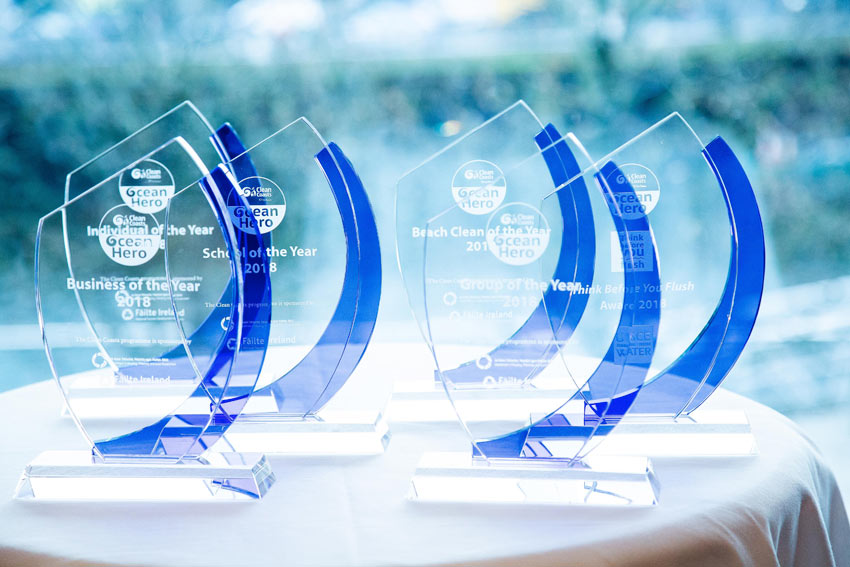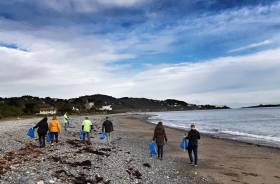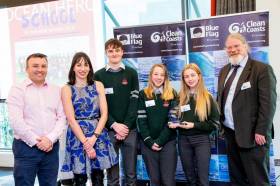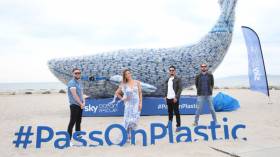Displaying items by tag: Clean Coasts
Clean Coasts have announced the winning photographers of the 14th edition of its Love Your Coast photography competition.
With a prize fund of €6,000, the competition has attracted hundreds of photographers all around Ireland this year, receiving a record number of over 1,300 entries.
Stephen Dunbar, with his “Humpback Feeding” captured in Broadhaven Bay, Co Mayo, won the Photographer of the Year title and first place in the Wildlife and the Coast category.
About the picture, Stephen said: “This image of a humpback whale was captured in Broadhaven Bay. I watched the whale feeding the day before from land. The next day, I was lucky enough to get out on a RIB with Brendan and Marcus from IWDG.
“We first encountered two huge basking sharks when they came over to our boat. After that, we found the humpback whale feeding in the bay with a handful of minke whales and lots of common Dolphins. Many birds feed in the bay, including kittiwakes, which are seen in the image, along with puffins, guillemots and razorbills.”
Winners in other categories included Peter Vandermeersch, for his photo “Horizon” in Bray, Co Wicklow in the Coastal Landscape category; Karol Ryan for “Sturgeon Moon, Ballycotton” in the Coastal Heritage category; Megan Gayda for “The Ocean Flare”, shot in Co Clare, in People and the Coast; Derek Bolton for “Emerald Jewel”, shot at Sovereign Island in Co Cork, in the Underwater category; and Robert Ledwith for “A Ray of Hope”, taken at Mullaghmore Beach in Co Sligo in Protectors of the Coast.
 Derek Bolton came first in the Underwater category as part of the 2023 Clean Coasts Love Your Coast photography competition with “Emerald Jewel”, taken in Sovereign Island in Co Cork
Derek Bolton came first in the Underwater category as part of the 2023 Clean Coasts Love Your Coast photography competition with “Emerald Jewel”, taken in Sovereign Island in Co Cork
In 2023, Clean Coasts celebrated its 20th anniversary of working with communities to help protect and care for Ireland’s waterways, coastline, seas, ocean and marine life.
Since 2010, the Love Your Coast photography competition has been a celebration of all the beauty and uniqueness of the Irish coast that Clean Coasts volunteers work to protect.
“Clean Coasts’ mission extends beyond a mere photography competition,” said Sinead McCoy, coastal communities manager. “Our coastal and marine environment form an integral part of Ireland’s identity. Through this competition, we invite the people in Ireland to appreciate, celebrate, and safeguard our coast, echoing the dedication of our over 2,000 volunteer groups working tirelessly to protect our marine environment.”
 Karol Ryan came first in the Coastal Heritage category as part of the 2023 Clean Coasts Love Your Coast Photography competition with “Sturgeon Moon, Ballycotton”, taken in Ballycotton, Co Cork
Karol Ryan came first in the Coastal Heritage category as part of the 2023 Clean Coasts Love Your Coast Photography competition with “Sturgeon Moon, Ballycotton”, taken in Ballycotton, Co Cork
See the top 50 images comprising the category winners and runners-up via the Clean Coasts website HERE.
Over 300 Beach Clean-Ups to Celebrate Clean Coasts’ 20th Anniversary on World Oceans Day
Over 4,000 volunteers have signed up to participate in the beach cleans happening all over the country this week as part Clean Coasts’s call to action for World Ocean Day on Thursday 8 June.
More than 300 clean-ups are set to take place in this year’s initiative which also doubles as a celebration of Clean Coasts’ 20th anniversary.
Since 2003, Clean Coasts has been working with communities to help protect and care for Ireland’s waterways, coastline, seas, ocean and marine life.
For the past 20 years Clean Coasts has been working to create tangible and immediate improvements to Ireland’s coastal environment, involving thousands of volunteers removing large quantities of marine litter from our coastline each year.
For this reason, the programme is looking forward to marking this milestone on World Ocean Day by doing something to protect the Irish coast and celebrating the amazing groups and volunteers around Ireland for the work they do all year round.
x
For 2023, the focus of World Ocean Day will be on the 30×30 campaign meaning that for us to create a healthy ocean with abundant wildlife and to stabilise our climate, it’s crucial that 30% of our planet’s lands, waters and ocean are protected by the year 2030.
Marine litter has become a global problem for humans and marine life alike. Making sure litter is collected and disposed of properly at the source is vital for a cleaner ocean and a greener world for all of us to enjoy.
The charity is asking everybody around Ireland to join its birthday celebrations and make a difference for our marine environment and wildlife.
Sinead McCoy, coastal communities manager with Clean Coasts says: “Happy 20th Birthday to the Clean Coasts community! Let’s celebrate by working together to protect our coastlines and waterways.
“The Clean Coasts network has over 2000 groups working across Ireland to clean up Ireland coastline, beaches and waterways. Join us in our clean-up efforts and let’s continue to make a positive impact and celebrate the incredible natural environment Irish has to offer.“”
If you missed your chance to register to receive a kit and host a beach clean of your own, you can still join an existing clean-up. Find out when and where they’re happening HERE.
‘Think Before You Flush’ Campaign Calls for Pledges to Help Keep Ireland’s Coasts and Waterways Clean of Bathroom Waste
An Taisce’s Clean Coasts programme and Uisce Éireann have launched their Think Before You Flush campaign for 2023, reminding people to the mindful of what we should and should’t put down our toilets.
In Cork city last week, as the Cork Independent reports, Lord Mayor Deirdre Forde signed the Think Before You Flush pledge — which you can also sign yourself at thinkbeforeyouflush.org — supporting the annual campaign which focuses on understanding the impact of flushing sewage-related waste and how to dispose of such waste properly.
Margaret Attridge of Uisce Éireann added: “Every day thousands of unsuitable items are flushed down toilets across Ireland instead of being put in the bin.”
Flushing unsuitable items such as baby wipes or cotton buds can result in blockages or even in such waste littering Ireland’s coastal beaches and inland waterways.
This waste is the third largest category of beach litter and can pose a danger to marine wildlife, the campaign says.
The Cork Independent has more on the story HERE.
Volunteer coastal cleaners in East Cork have gained the support of the joint venture behind a new proposed offshore wind farm project to boost their efforts in tackling the scourge of marine litter on the Irish coast.
As the Irish Examiner reports, Clean Coasts Ballynamona have inked a sponsorship deal with the Inis Ealga Marine Energy Park which will enable them to purchase a boat and other equipment to expand their abilities to clean and protect some 80km of coastline.
Clean Coasts Ballynamon comprise more than 300 volunteers who do regular beach cleans — and also manage 34 acres of coastal habitat to promote biodiversity in East Cork.
The Irish Examiner has more on the story HERE.
An Taisce’s Clean Coasts and National Spring Clean initiatives have joined up to encourage people all over Ireland to take part in a nationwide beach clean to mark World Oceans Day on Wednesday 8 June.
And they’re offering coastal communities, schools, groups and individuals a free clean-up kit with bags, gloves and hi-viz vests — everything they need to host their own beach clean event.
In 2022, the focus will once more be on the 30x30 campaign: to create a healthy ocean with abundant wildlife and to stabilise the climate, it’s critical that 30% of our planet’s lands, waters and ocean are protected by 2030. RTÉ Learn has more HERE.
Pledge to Do a Two Minute Beach Clean As Part of Your New Year’s Resolution
In a brand-new video, Clean Coasts is urging people to have a green New Year and choose a resolution they can commit to by pledging to do a #2minutebeachclean.
The video shows Dave (played by Bryan Quinn) trying to go into 2022 being better and greener by being more conscious of the environment. However, after several failed attempts he begins to lose hope until he finds himself on a beach in front of a #2minutebeachclean board and exclaims; “A 2-minute beach clean. So simple and keeps me green. New Year’s resolution in the bag!”
The campaign’s aim is to let people know that they don’t need to commit to a huge New Year’s resolution that they may not be able to sustain until the end of the year to make a difference. A #2minutebeachclean is an easy pledge to make that is flexible, doable and can be built on as your green year moves forward.
We have all seen marine litter along Ireland’s coastline. For all the beach lovers out there, the new year is an opportunity to do something about it in just 2 minutes! In 2021 2,000 people pledged to do a #2minutebeachclean and received a kit. For 2022, Clean Coasts are calling people around Ireland to visit their website and pledge to do a #2minutebeachclean to receive a reusable individual beach clean kit containing a tote bag and gloves.
How to take part in the #2minutebeachclean? The next time you are out and about along the coast or near a waterway, take two minutes to pick up some litter you see, share a picture of it on social media, tag Clean Coasts, use the hashtag #2minutebeachclean and dispose of the litter properly.
Sinead McCoy, Coastal Communities manager said; “The #2minutebeachclean is such a great initiative to get involved in. Every day, so many people around Ireland share their #2minutebeachclean on social media, and that helps show how easy it is to get involved and make a difference. By taking part, not only do you make an immediate positive impact for the marine environment and wildlife, but it’s also a chance to spend time outdoors by the sea, exercise and even practice mindfulness.”
To sign up to receive your own #2minutebeachclean kit, visit the Clean Coasts website at www.cleancoasts.org.
Clean Coasts & Irish Water Are Asking You to ‘Think Before You Flush’ on World Toilet Day
This Friday (November 19th) is UN World Toilet Day, a day to celebrate toilets and raise awareness of the 3.6 billion people worldwide living without access to safely managed sanitation. To mark the day, the Think Before You Flush campaign are asking you to value your toilet. Let’s look after our toilets and environment by only flushing the 3 P’s: pee, poo and paper, and putting everything else in the bin.
To launch the sixth year of the campaign, Clean Coasts and Irish Water are inviting the public to join the celebration of World Toilet Day. Think Before You Flush is a public awareness campaign operated by Clean Coasts in partnership with Irish Water. The campaign addresses the issue of flushing unsuitable items down the toilet and highlights the consequences: blockages in our wastewater network and treatment plants; surface water overflows; and sewage-related litter on our beaches and in our oceans, damaging our marine environment.
Recent research has found that one in four adults (24%) regularly admit to flushing items down the toilet that are known to cause blockages, causing detrimental effects on the wastewater network and the marine environment. Let’s value our toilets and look after our environment by only flushing the 3 P’s: pee, poo and paper. To celebrate World Toilet Day, Think Before You Flush are giving away a year’s supply of sustainable toilet paper. To enter, pledge to Think Before You Flush by heading to www.thinkbeforeyouflush.org.
 A fatberg formed in a sewer in Dublin comprising wet wipes and fats, oils and greases (FOGs)
A fatberg formed in a sewer in Dublin comprising wet wipes and fats, oils and greases (FOGs)
Speaking about the campaign, Sinead McCoy, Coastal Communities Manager, Clean Coasts said: There are still so many people across the world that don’t have access to proper sanitation, so for UN World Toilet Day we are asking people of to re-evaluate their flushing behaviour, respect your toilet and Think Before You Flush. Only flush the 3 P’s – pee, paper and poo – down the loo, and pop all other items into the bin. As when other items are flushed they cause issues for our wastewater system and can have a harmful impact on our natural environment.
Talking about the size and scale of the problem associated with flushing the wrong things down the toilet, Tom Cuddy, Irish Water said: “Every day people flush thousands of sanitary items such as wet wipes and cotton buds down the toilet instead of simply putting them in the bin. This causes blockages in our network, pumping stations and wastewater treatment plants. We clear approximately 2,000 blockages from our wastewater network every month.
Tom continued: “We are delighted to continue our partnership with Clean Coasts to deliver this important campaign together. We would like to thank the public for their ongoing support in the ‘Think Before You Flush’ campaign and together with Clean Coasts shine a light on the importance of World Toilet Day.”
Wellbeing of Oceans Must be Seen as An Investment Priority
In what is a key variable in the fight against climate change, the world’s oceans cannot be a mere afterthought on the global economic and environmental agenda.
As the Irish Examiner reports, The Earth’s oceans face many threats, none of which have quick fixes. Still, the solutions are known, and with a sufficiently broad coalition of partners, we can get the ball rolling on a number of fronts.
A wide range of human activities — from burning fossil fuels to over-fishing — have been degrading the oceans for years. By increasing the absorption of carbon dioxide, global warming is acidifying the oceans and reducing oxygen levels, harming or killing marine plants, animals, and other organisms.
And as the ice caps melt, rising sea levels are putting hundreds of millions of people in coastal areas at risk.
Moreover, owing to a lack of modern treatment plants in many cities, especially in Africa and Asia, sewage is being dumped into rivers and canals, where it eventually runs off into the oceans, introducing large amounts of plastic particles and toxins.
The tonnes of rubbish dumped daily into streets, backyards, rivers, beaches, and coastal areas also end up in the oceans.
To read further click here and the European Investment Bank's Clean Oceans Initiative. In addition to Ireland's Clean Coasts which organises various programmes throughout the year.
Clean Coasts Honours Ireland’s Ocean Heroes Of 2018
St Colman’s Community College in Midleton, Co Cork was named School of the Year in the recent Ocean Hero Awards presented by the Clean Coasts programme at the Clayton Hotel Cork City recently.
This year Clean Coasts’ Ocean Hero Awards celebrated 11 years of honouring the invaluable contribution Ireland’s coastal communities have made towards conserving our spectacular coastline.
The awards, originally known as the Merit Awards, were conceived in 2006, consisting then of only one category, The Clean Coasts’ Group of the Year.
Since then the Clean Coasts programme has grown to engage over 700 groups, becoming embedded in many coastal communities nationwide.
In an effort to recognise this growth, the number of Ocean Hero categories have also expanded to include Individual of the Year (won this year by Sean Ferguson), Beach Clean of the Year (won by Havin’ a Laugh), Business of the Year (Dive Academy, Wexford) and the Think Before You Flush campaign award (Galway Atlantaquaria_ as well as the original Group of the Year award (Keep Our Beaches Clean, Mayo).

The presence of marine litter in our oceans is a global concern that requires action. Adequate measures are needed to address the impacts of litter in the marine environment
both at sea and on land whereby public awareness and community action plays a vital role.
The Clean Coasts Ocean Hero Awards and Ocean Talks bring together key stakeholders in the area of marine litter such as coastal communities, NGOs, tourism bodies, the science community, business and the fishing industry.
Ocean Talks speakers included Minister of State Damien English; Ken O’Sullivan, creator of RTÉ’s Ireland's Deep Atlantic; Sinead McCoy, coastal communities manager with the Environmental Education Unit at An Taisce; and Annabel Fitzgerald of Irish Water.
McCoy said: “Over the past 12 years the Clean Coasts programme’s Ocean Hero Awards have really brought to the fore the remarkable work and wonderful coastal celebration events that Clean Coasts volunteers have been involved in along the Irish coastline.
“We hope next year is no different as we look forward to receiving inspirational nominations that show the true dedication of these coastal custodians.”
Clean Coasts is operated by the Environmental Education Unit of An Taisce and is funded by the Department of Housing, Planning, and Local Government and Fáilte Ireland.
New Web Series Follows The Riptide Movement As They Discover The Impact Of Plastic In Our Oceans
The Riptide Movement’s Plastic Oceans is a three-part web series that hopes to add to the urgent and important debate about how to solve the global plastic crisis and the devastating effect it is having on our marine life.
The Clean Coasts programme took Dublin rock band The Riptide Movement along the incredible Irish coastline and met with some of Ireland’s leading marine biologists, researchers, campaigners and Clean Coasts volunteers to discover the real impacts of plastic in our oceans and what it means for the future of all life on our planet, including us.
The Clean Coasts programme engages communities in the protection of Ireland's beaches, seas and marine life and currently has over 650 volunteer groups working along our Irish coastline, carrying out beach cleans and coastal protection work.
The band also visit a number of locations leading the way in tackling plastic waste including University College Cork, a Green Campus awarded site; chatted with Amanda Byram at the launch of Sky Ocean Rescue in Ireland; and sat down with the Minister for Housing, Planning & Local Government Eoghan Murphy to see what actions the government are taking and what can be done to address the issue at policy level.
Regarding wildlife, a visit to Ireland’s only seal sanctuary and a panel discussion with filmmaker Sophie Darlington highlights the impact our love of plastic is having on our marine animals.
The result is a web series aptly titled ‘The Riptide Movement’s Plastic Oceans’. Narrated by Jerry Fish, this web series highlights the extent of the plastic crisis in Ireland in an informative, artistic and engaging way, whilst also showcasing the small changes we can make to help stem the tide of single use plastics.
Talking about the web series and the bands’ collaboration with Clean Coasts, lead singer Malachy Tuohy said: “We hope this web series and our music can help raise more awareness around one of the greatest environmental challenges of our time.
“Our reliance on single use plastics is destroying our oceans, a reality so poignantly highlighted by David Attenborough in Blue Planet 2. Through our web series we wanted to learn about the issue of plastic pollution here in Ireland and what small changes we can make to help stem the tide of single use plastics.
“Our oceans are drowning in plastic and it is not the legacy we want our generation to be remembered for.”
Speaking about the web series, Clean Coasts manager Sinead McCoy said: “Litter and particularly marine litter has a huge long term negative impact on our environment. Raising public awareness is incredibly important when it comes to reducing marine litter which we see washing up on our coastline on a daily basis.
“So, the Clean Coasts programme is delighted The Riptide Movement are using their influence to bring attention to not only the issue of marine litter but the incredible work being done by Clean Coasts groups and our Clean Coasts stakeholders.”
For more information on how to get involved in Clean Coasts programme see cleancoasts.org


























































